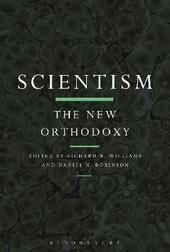
|
Scientism: The New Orthodoxy
Paperback / softback
Main Details
| Title |
Scientism: The New Orthodoxy
|
| Authors and Contributors |
Edited by Dr. Richard N. Williams
|
|
Edited by Professor Daniel N. Robinson
|
| Physical Properties |
| Format:Paperback / softback | | Pages:208 | | Dimensions(mm): Height 234,Width 156 |
|
| Category/Genre | Philosophy
Philosophy of science |
|---|
| ISBN/Barcode |
9781474287944
|
| Classifications | Dewey:149 |
|---|
| Audience | | Tertiary Education (US: College) | |
|---|
|
Publishing Details |
| Publisher |
Bloomsbury Publishing PLC
|
| Imprint |
Bloomsbury Academic
|
| Publication Date |
19 May 2016 |
| Publication Country |
United Kingdom
|
Description
Scientism: The New Orthodoxy is a comprehensive philosophical overview of the question of scientism, discussing the role and place of science in the humanities, religion, and the social sciences. Clarifying and defining the key terms in play in discussions of scientism, this collection identifies the dimensions that differentiate science from scientism. Leading scholars appraise the means available to science, covering the impact of the neurosciences and the new challenges it presents for the law and the self. Illustrating the effect of scientism on the social sciences, and the humanities, Scientism: the New Orthodoxy addresses what science is and what it is not. This provocative collection is an important contribution to the social sciences and the humanities in the 21st century. Contributors include: Peter Hacker, Bastiaan van Fraassen, Daniel N. Robinson, Kenneth Schaffner, Roger Scruton, James K.A. Smith, Richard Swinburne, Lawrence Principe and Richard N. Williams.
Author Biography
Richard N. Williams is Professor of Psychology and Director of the Wheatley Institution at Brigham Young University, USA. Daniel N. Robinson is Professor of Philosophy at the University of Oxford, UK, and Distinguished Professor Emeritus at Georgetown University, USA.
ReviewsScientism: The New Orthodoxy is a rich and rewarding collection of essays from a wide range of perspectives. I can easily envision parts of it being taught - perhaps alongside more fundamental work in the philosophy of science and epistemology - in upper-level undergraduate or graduate seminars that want to engage contemporary intellectual life and the relations between science and philosophy. I hope it finds a wide readership among philosophers and other humanities scholars, as well as among scientists and the broader public. -- Jeroen De Ridder, VU University Amsterdam, The Netherlands Overall, the volume provides points of entry into the worries philosophers of several different schools have raised about scientism. Readers who have encountered attempts to adjudicate social-scientific, humanistic, or religious claims on the basis of the natural sciences and come away thinking something is amiss will find here several candidate diagnoses and critiques ... The book's optimal home might be courses in which the individual articles could provide occasion for such contextualization and further critical discussion. -- Steven Horst, Wesleyan University * Notre Dame Philosophical Reviews * Scientism: The New Orthodoxy is a rich and rewarding collection of essays from a wide range of perspectives. I can easily envision parts of it being taught - perhaps alongside more fundamental work in the philosophy of science and epistemology - in upper-level undergraduate or graduate seminars that want to engage contemporary intellectual life and the relations between science and philosophy. * Notre Dame Philosophical Review * Scientism is an over reliance on or overconfidence in the sciences as the only route to reliable knowledge. It is motivated by successful and effective technological outcomes that suggest scientific methods are a great, if not the best, source of knowledge for addressing any and all problems ... This eclectic volume, which varies widely in style and scope, includes historical perspectives on scientism, religion, culture, and the humanities; critical assessments of cognitive neuroscience and neuroethics; and reflections on naturalism in epistemology. Two messages emerge from the variety: scientism must be distinguished from the sciences, and the practices and results of the sciences require explicit interpretation ... Summing Up: Recommended. Graduate students and faculty. -- A. C. Love, University of Minnesota * CHOICE *
|